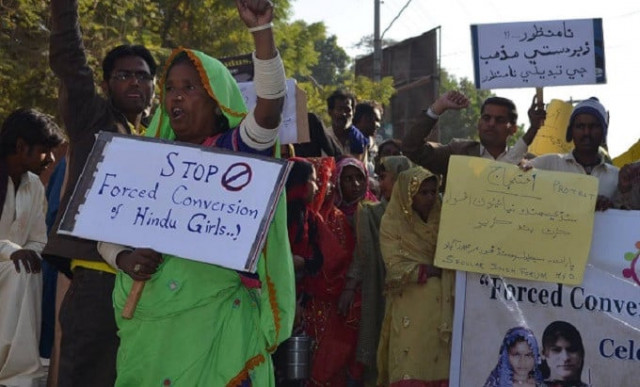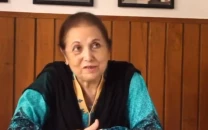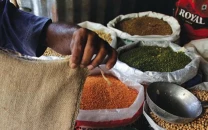Coerced religious conversions continue in Sindh
Legislation tabled in 2016 remained with provincial legislature for two terms

Despite the passage of seven years, the two consecutive governments of Pakistan Peoples Party could not get the law against forced religious conversion passed by the Sindh Assembly regardless of the rising trend of adductions, forced marriages and conversion of young girls belonging to religious minorities.
According to Hindu and Christian activists more than 500 girls are forced in to marriage with Muslim men and to convert their religion in the country every year.
"Hindu community members living in rural areas of Sindh are losing one girl or other to the menace of forced conversion," said Nand Kumar Goklani, a former minority MPA belonging to Grand Democratic Alliance (GDA) who moved the bill against forced conversion.
"I tabled the bill in the Sindh Assembly against the force conversion. The assembly initially passed the bill unanimously in 2016, but later succumbed pressure to religious parties and extremists groups and withdrew it," he said.
Goklani continued that soon after the legislative assembly passed the bill and referred it to governor for his assent, religious groups threatened to surround CM House and Governor House to protest against the proposed law.
The protest threat by religious parties compelled the then governor to not sign on the bill and he returned it to the assembly. It means the law could not become an act, that was a legal requirement, Goklani said.
Salient features
The bill against forced conversion called Criminal Law (Protection of Minorities) stated that forced conversion is an abhorrent and violent offence and an issue that has become prevalent across Sindh [that] must be eliminated by recognising the importance of tolerance, peace and respect for all religions and persons, irrespective of their religion.
The legislation focused on recognising the right to freedom of religion of all persons, the right to freedom to marry and freedom of choice of marriage of all persons. "No person shall be deemed to have changed their religion until they attain the age of maturity, which is 18 years. Similarly, the decision of a minor to convert to another religion will not be recognised until they reach the age of maturity," the proposed law said.
The bill against forced conversion further said, "Any person who forcibly converts another person shall be liable to imprisonment ranging from five years to life and a fine will have to be paid to the victim," adding that the facilitators of the forced marriages shall also be liable to imprisonment for a minimum of three years or a fine to be paid to the victim or victims.
"Any person who has provided logistical support or any other essential services for the marriage ceremony," states the law.
'Conversion factories'
Kareena Kumari, a young Hindu girl who was allegedly kidnapped, told the court in June this year that she was forcibly converted to Islam and married to Muslim boy in Shaheed Benazirabad district. She was later sent to a women protection centre with court orders to return the girl to their parents.
Her father while speaking to media said, "Some religious extremists especially Mian Abdul Haq aka Mian Mithu, of upper Sindh are running conversion factories where the non-Muslims girls are being kidnapped and married to Muslims boys."
He went on to say that there was no law against forced conversion; therefore the state does not take action against the culprits. "We requested the court to punish the culprits who abducted and sexually molest my daughter," he said, adding that even after the legal formalities the culprits have been granted bail.
In March this year, three Hindu girls - Satran Oad, Kaveeta Bheel and Anita Bheel - were also allegedly abducted, converted to Islam and married to Muslim men. The people involved in their abduction presented the papers in the court that the girls were adults and married to them of their own free-will.
According to Dilip Kumar Manglani, the rights activist who pleads the cases against forced conversion, "in most of the cases, the accused produce fake documents including the birth certificates showing minor Hindu girls as adults and nikahnama."
"Most of the parents of the kidnapped Hindu girls are poor. They cannot pursue the cases and confront such elements who have full backing of extremist groups, police and other elements," Manglani said.
Two Muslim clerics Mian Abdul Haq known as Mian Mithu and Pir Ayoub Jan Sarhandi are said to be involved in the forced conversions. Pitambar Sewani, former lawmaker belonging to Hindu community, said that many people of their community have left the country because of the forced conversion of girls. He added that most of the people who kidnap Hindu girls take refuge with Mian Mithu in Upper Sindh. "No one can fight against these extremist elements who are more powerful than the state," Sewani said.
On the other hand, the Mian Mithu refuted the claims about the forced conversion and said that all the allegations are baseless and he only facilitated the free-will marriages of the Hindu girls and Muslim boys. "If any girl wants to convert their religion and become Muslim then we will welcome this step," he said, adding that the media and some groups were propagating against him under nefarious designs.
The Sindh Assembly has recently finished its five years tenure. However, commenting on not passing law against forced conversion, former parliamentary affairs minister Mukesh Kumar Chawla acknowledged that it was a serious issue and said that his party leadership especially Bilawal Bhutto Zardari had given directives to outgoing chief minister to pass the law, but assembly finished its tenure. "We are confident that PPP will again come into power and we will pass the law in the next assembly," he remarked.
Published in The Express Tribune, August 23rd, 2023.



















COMMENTS
Comments are moderated and generally will be posted if they are on-topic and not abusive.
For more information, please see our Comments FAQ